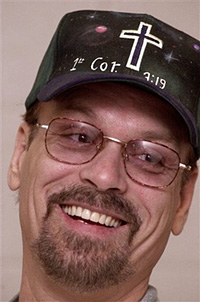 |
 |
 |
 Editorials | Issues | May 2007 Editorials | Issues | May 2007  
Doubts About the Guilt of the Convict - a Dubious Execution in Tennessee
 AFP - Le Devoir AFP - Le Devoir


| | Death row inmate Philip Workman talks during an interview at Riverbend Maximum Security Institution in Nashville, Tenn., in this April 4, 2001, file photo, taken after he was granted a stay of execution 30 minutes before he was to die for the 1981 death of Memphis police officer Ronald Oliver. (AP/Mark Humphrey) |
A 53-year-old man, condemned to death for the murder of a police officer during a holdup in 1981, was executed in Tennessee despite doubts about his guilt, several organizations which favor or oppose the death penalty report.

Philip Workman was declared dead Wednesday at 1:38 a.m. after having received a deadly triple injection in the Nashville prison.

The night of August 5, 1981 Philip Workman held up a restaurant in Frayser, close to Memphis. Arriving on the scene with two colleagues just as the robber was leaving, 43-year-old Lieutenant Ronald Oliver was killed by a bullet to the head.

The following year, Workman was found guilty of murder and condemned to death. Since then, the defense has demanded a new trial, deeming that the policeman was probably killed by a colleague's accidental shot: no ballistic analysis was conducted; no policeman saw the robber shoot; and the only witness against him at the trial subsequently retracted his testimony.

Philip Workman was never allowed a second trial, but after numerous last-minute reprieves, he had recently declared to a local television station: "On the one hand, all that is really sad. On the other hand, I'm tired. It's time to get it all over with."

Mr. Workman is the eighteenth condemned person executed this year in the United States and the third in Tennessee since the death penalty was reestablished in the country in 1976.

In a recent report, the American Bar Association denounced the application of the death penalty in Tennessee, described as failing by virtue of the absence of procedures to assert potential judicial mistakes and of the lack of training given public defenders.

Translation: t r u t h o u t French language correspondent Leslie Thatcher. | 
 | |
 |



